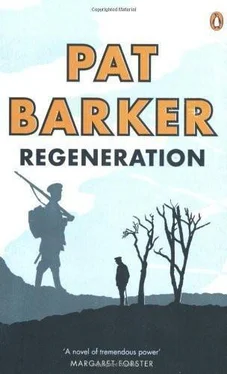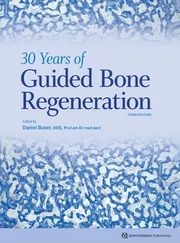Outside, in the corridor, she looked up and down, realizing she didn’t know in which direction the exit lay. She was surrounded by notices directing people to the pharmacy, the path lab, the X-ray department, everywhere except the way out. She tried walking to her left, but her way was blocked by a large notice saying: THEATRES. NO UNAUTHORIZED PERSONNEL BEYOND THIS POINT. She turned right, and shortly afterwards came to a corridor she thought she recognized, and began to walk along it, but the feeling of familiarity soon vanished. The building was enormous, and seemed to have no plan, no structure to it, at all. To add to the sense of unreality most of the notices referred to its civilian use before the war. Maternity, she read, and then the swing doors banged open to reveal beds full of people who were most unlikely ever to give birth.
Obviously she ought to stop and ask somebody, but then everybody seemed to be in such a hurry, and so grim-faced. At last she found a door that led out to the grounds at the back of the hospital, where the tall chimney of an incinerator dribbled brownish-yellow smoke. Here, a huge tent had been erected and this served as another ward. She glanced into the interior, which was golden in the sunlight filtered through the roof, but the atmosphere was close, stifling, a humming darkness in which the clumsiness of bandages and the itch of healing skin must be almost intolerable.
A constant traffic of nurses and orderlies passed between the tent and the main building, and, feeling herself to be in the way, Sarah looked around for somewhere she could find temporary refuge and not bother anybody. There was a conservatory along the side of the hospital, facing east so that at the moment it caught the full warmth of the sun. Shadowy figures sat inside, and the door was open so she thought she might perhaps sit there.
Once across the threshold she became aware of a silence, a silence caused, she suspected, by her entrance. She was still dazzled by the brightness of the light outside and the relative dimness of the interior, and so she had to blink several times before she saw them, a row of figures in wheelchairs, but figures that were no longer the size and shape of adult men. Trouser legs sewn short; empty sleeves pinned to jackets. One man had lost all his limbs, and his face was so drained, so pale, he seemed to have left his blood in France as well. The blue of the hospital uniform looked garish against his skin. They’d been pushed out here to get the sun, but not right outside, and not at the front of the hospital where their mutilations might have been seen by passers-by. They stared at her, but not as the men had stared on the other ward, smiling, trying to catch her eye. This was a totally blank stare. If it contained anything at all, it was fear. Fear of her looking at the empty trouser legs. Fear of her not looking at them. She stood there, unable to go forward, and unable, for a few crucial moments, to turn back, until a nurse bustled up to her and said, ‘Who is it you want to see?’
‘I’m just waiting for a friend. It’s all right, I’ll wait outside.’
She backed out, walking away in the sunlight, feeling their eyes on her, thinking that perhaps if she’d been prepared, if she’d managed to smile, to look normal, it might have been better. But no, she thought, there was nothing she could have done that would have made it better. Simply by being there, by being that inconsequential, infinitely powerful creature: a pretty girl , she had made everything worse. Her sense of her own helplessness, her being forced to play the role of Medusa when she meant no harm, merged with the anger she was beginning to feel at their being hidden away like that. If the country demanded that price, then it should bloody well be prepared to look at the result. She strode on through the heat, not caring where she was going, furious with herself, the war… Everything.
∗
Prior took off his clothes, put on the white hospital gown and sat on the bed to await the arrival of the doctor. This was his second visit. The first time he’d seen Eaglesham, the consultant, a big, kindly, grizzled bear of a man who’d said very little but whom he’d trusted at once. He’d raised his eyebrows when Prior blew into the Vitalograph or whatever the machine was called, but he hadn’t said what he thought, and Prior had not wanted to ask. It wasn’t going to be Eaglesham today, though. A much younger man with a sallow skin and slick dark hair was popping in and out of the other cubicles. Prior looked down at his thin white legs. He didn’t see why he had to take all his clothes off. Were they trying to cater for some unforeseen medical emergency in which his lungs had slipped into his pelvis? He didn’t like the way the gown fastened at the back. He didn’t mind displaying his wares, if he liked the other person and the time seemed right, but he did like the illusion at least that the act was voluntary. He could hear the doctor’s voice in the cubicle next door, talking to a man who couldn’t complete a sentence without coughing. At last the curtains were pushed aside and the doctor came in, followed by a nurse, clasping a beige file to her bosom. Prior slipped off the robe and stood up to be examined.
‘Second-Lieutenant Prior.’
‘Mister’ he wanted to say. He said, ‘Yes.’
‘I see there’s some question whether you’re fit to go back. I mean apart from the state of your nerves. ’
Prior said nothing at all.
The doctor waited. ‘Well, let’s have a look at you.’
He moved the stethoscope all over Prior’s chest, pressing so hard that at times the stethoscope left overlapping rings on the skin that flushed and faded to white. He thinks I’m shirking, Prior thought, and the idea made him go cold.
‘How are your nerves?’ the doctor said.
‘Better.’
‘Shell explosion, was it?’
‘Not exactly.’
Not one word of what he’d told Rivers would he repeat to this man.
‘Do you think you’re fit?’
‘I’m not a doctor.’
The doctor smiled. Contemptuously, it seemed to Prior. ‘Keen to get back, are we?’
Prior closed his eyes. He had a picture of himself driving his knee into the man’s groin, and the picture was so vivid that for a moment he thought he might have done it, but then he opened his eyes and there was the sallow face, still smiling. He stared at him.
The doctor nodded, almost as if Prior had replied, and then slowly, to avoid any suggestion of backing off, turned and made a brief note on the file. It’s all bluff, Prior thought. It’s what Eaglesham says that matters.
He was in a torment as he got back into his uniform, reckoning his chances, despising himself for reckoning them. He didn’t thank Rivers for any of this. I haven’t lied to any of them, he thought. I haven’t made things out to be worse than they really are. He finished lacing his puttees and stood up. The nurse came back with a card. ‘If you tell them at the appointments desk, three weeks.’
‘Yes, all right. Thank you.’
He took the card, but walking down the long corridor afterwards he was tempted not to make the appointment. In the end he did, then put the card away and strode out into the hospital grounds as fast as he could. He thought he might buy himself something from the barrow at the entrance, fruit or sweets, any little treat that might make him feel better. Less contaminated.
He saw her before she saw him, and called out, ‘Sarah.’ She turned and smiled. He’d thought about her a lot while he’d been in the sick bay, remembering that time on the beach. Illness, once the worst was over, always made him randy. What he’d forgotten, he thought now, looking at the yellow face beneath the aureole of extraordinary hair, was how much he liked her.
Читать дальше












